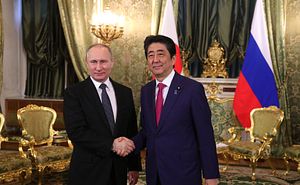Late last month, Japanese Prime Minister Shinzo Abe spent almost three hours meeting with Russian President Vladimir Putin in Moscow. It was the first summit between the two leaders since Putin’s trip to Japan in December last year. We can assume that their most recent discussion built on of the outcomes of the summit in December. What were these outcomes?
In short, Japan and Russia started the process of building full-scale confidence toward the resolution of the territorial issue and the conclusion of a peace treaty. At an international conference in Sochi on the Russian Black Sea coast in October last year, I had the opportunity to ask Putin directly if it was realistic to expect Japan and Russia to create an environment that would allow a peace treaty to be concluded in the near future. In response, the Russian president observed that it took Russia and China 40 years (to build a relationship of mutual trust strong enough to resolve their territorial issues) and pointed out that Russia and Japan had unfortunately not yet reached that stage.
There are three approaches to building Russo-Japanese confidence.
The first involves acting on the eight-point cooperation plan that Japan proposed at the Japan-Russia summit in Sochi in May 2016. Eighty memorandums were signed for both the public and private sectors when Putin visited Japan in December 2016. Additionally, 29 memorandums were exchanged over matters on which progress was confirmed, as well as new issues. We can call the acquisition of about 10 percent of the shares of R-Pharm, a Russian pharmaceutical company, by Mitsui & Co., Ltd. a specific achievement from the latest summit. The Eastern Economic Forum, scheduled to take place in Vladivostok in September 2017, is expected to produce further results.
The second approach entails discussions for advancing joint economic activities under a special system that does not threaten the sovereignty of either Japan or Russia in the Northern Territories. At their recent meeting, Abe and Putin agreed to prepare a list of priority projects in the near future, in addition to sending a joint public-private study team to the Northern Territories by the end of May 2017 at the earliest. They also agreed to permit concerned Japanese citizens to fly to the islands, which had previously been accessible only by ship. However, the two leaders did not reach an agreement on the special system.
The third approach would be continued diplomatic and security talks, including those for resuming the Japan-Russia Foreign and Defense Ministerial Consultation (“2+2” Ministerial Meeting). Japan and Russia agreed to launch a framework for 2+2 meetings when Abe visited Russia in April 2013. Based on that agreement, the two countries held a first round of 2+2 meetings in November 2013. However, the framework has been virtually frozen since Russia annexed Crimea in March 2014.
The two countries did agree in principle on the need to resume their 2+2 meetings when Putin visited Japan in December 2016. However, no specific announcement was made. On February 17, 2017, Abe and Putin officially announced the resumption of 2+2 meetings, just after Abe traveled to the U.S. and held his first formal talks with new U.S. President Donald J. Trump. Subsequently, the 2+2 meetings were held in Tokyo in March 2017, for the first time in almost three years and four months.
Abe and Putin meanwhile held extensive discussions at their latest summit, particularly over issues regarding North Korea. Following those talks, both Abe and Putin held phone calls with the U.S. president, with discussions encompassing North Korea. Abe may have acted as something of a catalyst in the still-delicate relationship between Trump and Putin.
And so Japan and Russia embarked on a confidence-building process in the wake of Putin’s visit Japan in December last year. Real progress in negotiations on signing a peace treaty, including the Northern Territories issue, is unlikely for the time being, as the Russian presidential elections are scheduled to be held in March 2018. However, Abe and Putin should meet three more times before the end of this year, at the G20 Summit in July, at the Eastern Economic Forum in September, and at the APEC Summit in November. Currently, Russo-Japanese relations are at the stage of building specific cooperative relationships in the economic and security spheres for the medium and long terms. Viewed in those terms, bilateral relations are indeed moving forward.
Taisuke Abiru is Senior Representative for Moscow for the Japan Bank for International Cooperation.

































